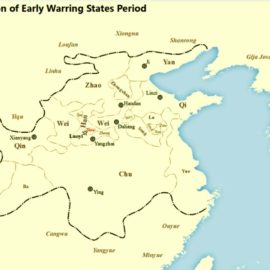
What role did alliances play in reshaping the Middle East during World War I? How did European powers’ decisions impact the region’s future?
During World War I, through secret agreements and calculated promises, Britain and France carved up territories of the Ottoman Empire. In A Peace to End All Peace, David Fromkin explains that this laid the foundation for modern nations such as Israel, Jordan, and Syria.
Continue reading to explore the complex web of alliances, broken promises, and strategic decisions that impacted the Middle East in WWI and beyond.
The Middle East in WWI
David Fromkin argues that the current state of the Middle East is largely due to decisions Europe made during and after World War I. Before this war, countries such as Israel, Jordan, and Syria didn’t exist—they were all part of the Ottoman Empire. Key decisions involving the Middle East in WWI set the stage for a new landscape.
World War I pitted the Allies against the Central Powers from 1914 to 1918. First, we’ll discuss how shifting alliances set the course for the war. Then, we’ll explore how those shifts informed two key decisions the Allies made:
- The Sykes-Picot agreement outlining how the Allies would split the territories of the soon-to-be-dismantled Ottoman Empire
- The Balfour Declaration supporting the creation of a Jewish national home in Palestine
Essential Context: Conflicting Alliances
Fromkin discusses the conflicting alliances during World War I. These alliances complicated Britain’s efforts to negotiate with any single group. In addition, Britain struggled to balance immediate goals, such as winning the war quickly, with long-term goals, such as placing British-friendly leaders in strategic places. We’ll describe some of these alliances.
The Triple Entente
Russia’s alliance with Britain and France (“The Triple Entente”) was in peril due to an economic crisis that led to the Soviet revolution. Vladimir Lenin, a Soviet leader who advocated for ending Russia’s involvement in the war, seized control of the Russian government in 1917. Fromkin claims that Britain tried to stall Russia’s exit from the alliance by appealing to the interests of Russian Jews, mistakenly thinking they held a lot of power in the government. Despite Britain’s attempts, Russia signed a peace treaty with Germany in 1918 and left the Entente.
The Anglo-Zionist Alliance
Fromkin argues that Britain’s alliance with Zionism during the war supported both their wartime and postwar goals. Zionism aimed to establish a Jewish homeland in Palestine so Jews could self-govern and live free from persecution. The British mistakenly believed that Jews in the US had significant influence and that supporting Zionism would give Britain political and financial backing from the US and Russia. Britain also aimed to control Palestine postwar to block German dominance of key routes to British colonies in Asia and the Pacific, such as India and New Zealand. An alliance with Zionism ensured Palestine remained friendly to British interests.
Fromkin notes that the Zionist movement arose amid 19th-century European nationalism, which advocated national freedom but fostered intolerance toward minorities. Jews in Western Europe faced hostility and questions about their national identity, while Eastern European Jews endured legal restrictions and violent pogroms (organized massacres of minority groups). These adversities led to calls for an independent Jewish state. Zionist leaders chose Palestine for its religious significance and the existing Jewish communities settling there.
Anglo-Arab Alliances
Fromkin reveals that the British were intentionally vague in their promises to Arabs and Zionists regarding Palestine, knowing they couldn’t keep their promises to both groups. Also, he says the British government believed Middle Eastern leaders could help end the war more quickly by inciting rebellion within the Ottoman Empire. The British led and financed Arab uprisings to destabilize the region, promising their local agents they’d be able to govern themselves. These revolts helped the British take over key cities across the Arab Ottoman territories.
The Anglo-French Alliance
At the same time, supporting any level of Arab independence challenged France’s regional objectives in Syria-Lebanon, whose Christian communities were under French protection. Fromkin argues that British officials thwarted French objectives in the Middle East. For instance, they supported an Arab leader in Syria despite the French wanting Syria for themselves.
Key Decision: The Sykes-Picot Agreement (1916)
According to Fromkin, the Sykes-Picot Agreement—named after Mark Sykes and François Georges-Picot, the negotiators for Britain and France—marks a pivotal point in Middle Eastern history. Signed in 1916, this secret agreement between Britain and France attempted to resolve their tensions by outlining their plans for the Ottoman Empire after the war.
The Sykes-Picot Agreement tried to balance France’s goal to control some Middle Eastern territories and Britain’s goals to maintain influence over the region and give some independence to Middle Eastern leaders. Fromkin explains that Britain and France agreed on the following arrangement:
- The British Empire would have control of modern-day Iraq and the Haifa and Acre districts in modern-day Israel, providing Britain with access to the Mediterranean Sea.
- The British Empire would have political influence over modern-day Jordan and southern Iraq. This influence would include choosing rulers and shaping their international policies.
- France would have direct control over Cilicia in southeastern Türkiye, the coastal region of modern Syria, Lebanon, and parts of Iraq.
- Both the British Empire and France would have administrative power over Palestine.
Key Outcome: Setting the Stage for the Modern Middle East
Fromkin argues that the Sykes-Picot Agreement laid the groundwork for many of the tensions and conflicts we see in the Middle East today. The agreement carved out new nations without much regard for ethnic or sectarian divisions. The arbitrary division of territories fueled resentment in the region toward Western powers. The agreement also overlooked Arab leaders’ ambition for full independence, and its secrecy heightened their feelings of betrayal.
Key Decision: The Balfour Declaration (1917)
A year after the Sykes-Picot agreement, Britain made another decision that would change the trajectory of the Middle East: the Balfour Declaration supporting a Jewish state. The declaration took the form of a letter from Britain’s Foreign Secretary Arthur Balfour to Lord Rothschild, a prominent Jewish man in London society.
Fromkin argues that the Balfour Declaration built on the Zionist movement’s momentum and was a result of the successful Zionist lobbying of British policymakers during World War I. Through the declaration, Britain hoped to secure Jewish support in the war and ensure that Palestine was under British influence after the war.
The letter marked the first time a major world power endorsed the idea of Jewish statehood. Specifically, it expressed British support for the establishment of “a national home for the Jewish people” in Palestine and paved the way for the creation of Israel. Fromkin explains that the letter’s wording was intentionally ambiguous so as not to overcommit Britain. An initial draft, created in consultation with British Zionist leaders, stated that Palestine should be the Jewish people’s national home. After some back-and-forth with the government, it turned into a national home for the Jewish people in Palestine.
On December 11, 1917, British forces entered Jerusalem, aided by Arab tribesmen, Bedouin fighters, Ottoman prisoners of war, and Jewish-Palestinian spies. Fromkin explains this marked the end of Ottoman rule and the start of the British administration of Palestine. In 1920, the League of Nations Mandate for Palestine officially put the region under British control.
Key Outcome: The Israel/Palestine Conflict
Fromkin notes that the Balfour Declaration was contentious from the start. It promised that Jews could have land already inhabited by an Arab majority, and it conflicted with earlier British promises to Arabs and the French. In 1915, Britain promised independence to their Arab allies in exchange for their help against the Ottomans. Britain also promised the French joint rule over Palestine through the Sykes-Picot agreement. Fromkin argues that French support for Zionism was aimed at keeping Zionist leaders involved in the war, not a commitment to a Jewish state.
The Balfour Declaration stated that the British government would support efforts to establish a Jewish national home in Palestine without negatively affecting the religious and civil rights of the Muslim and Christian populations already living there.
Fromkin explains that Britain struggled to govern Palestine while balancing their goals with the interests of Jewish and Arab allies. British officials in Palestine delayed announcing the Balfour Declaration to avoid alarming locals. In contrast, the British Foreign Office set up a Zionist Commission to prepare for a Jewish homeland, which faced resistance from the Arabs.






